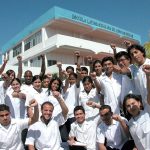Cuban Software for Medicine, Games, Cell Phones Blocked from U.S.
No U.S. Market for Cuban Software Exports
By lch/as/iff/ro
Prensa Latina
 Havana – With over 150 million USD in annual incomes, the Cuban state-owned company Albet currently commercializes information solutions in Latin American countries, Spain and Angola, as prospects for entering the U.S. market appear dim.
Havana – With over 150 million USD in annual incomes, the Cuban state-owned company Albet currently commercializes information solutions in Latin American countries, Spain and Angola, as prospects for entering the U.S. market appear dim.
Daisy Oropesa, general director of the entity created in 2005, stated that some of its 30 products could be sold to small and medium companies in the United States, if the anti-Cuban White House policy did not hinder it.
In the face of that situation, we focus our options mainly on the members of the Bolivarian Alliance for the Peoples of Our America (ALBA), Oropesa told the press, after listing Mexico, Argentina and Venezuela as its main customers.
Questioned about potential markets in Europe, Oropesa said they have not been able to enter that market as they had hoped, except for small exports in Spain.
Oropesa stated that the United States is also deprived of health technologies produced by Albet that have great prestige in Latin America.
The U.S. hostile policy has recently caused losses valued at 17 million USD to the company, which commercializes productions from the Information Sciences University and other Cuban entities.
Source: Prensa Latina
Cuban Software to Benefit the Health Sector
By Staff
ACN via Radio Cadena Agramonte
 Havana, Cuba – A Cuban software for computerization in the health sector was presented in the 14 International Fair and Convention on Informatics 2011 (Informatica 2011).
Havana, Cuba – A Cuban software for computerization in the health sector was presented in the 14 International Fair and Convention on Informatics 2011 (Informatica 2011).
ALAS PACS-RIS, from the University of Informatics Sciences (UCI), is one of the 23 projects exhibited in Pabexpo, in the room ‘Overview on Information and Communication Technologies in Cuba’.
Engineer David Crespo, one of its creators, told ACN news agency that this system allows capturing, storing and visualizing digital images, and contributes to improving accuracy on the treatment of diagnosed diseases from radiological studies.
The deputy director of the Hermanos Ameijeiras Hospital, Carlos Santos, noted that with this software it is possible to visualize the images generated in the 87 working stations of the hospital can be seen in any specialized area right after they are taken.
Santos pointed out that it eases the work of doctors in an operation room, offering a more accurate diagnosis.
ALAS PACS-RIS is currently used in 10 national hospitals and in seven in Venezuela.
Informatica 2011 brought together about 2,000 experts from 35 countries in Havana’s Convention Center and includes 14 scientific meetings, such as the international congresses on Informatics in the health and education sectors.
Source: ACN via Radio Cadena Agramonte
New Cuban Software for Teaching Chess
Yahoo Groups
Cienfuegos – Primary school students in the Cuban province of Cienfuegos have new software to learn chess in an easier and more interesting way, reported the CNA news agency.
The software won the first prize in the category of teaching software at the 2007 provincial Infoclub competition, which gathered the most outstanding innovations created by members of the island’s Youth Computer Clubs program.
Computer science instructor Maikel Migollo and national chess master Wilfredo Sanchez are the program’s authors, for whom it took two years to create and improve the tools for speeding up students’ learning.
With the software, youth obtain a quick command of the sport and learn the basics of the game, such as board arrangement, the movements of the various pieces, and different types of moves.
The students go on to learn the history of the discipline in Cuba and around the world. In addition, they study the strategies of renowned world champions, as well as their participation in national and international competitions.
The program includes exercises, useful advice and graphic humor, yet allows the students to take a break when a lack of focus distracts them from making a checkmate.
The program – which is aimed at developing skills in kids and encouraging them to study the discipline – can now be distributed across the rest of the country.
Source: Yahoo Groups
Information Sovereignty: Cuba Launches New Operating System and Cell Phone Platform
By Staff
Juventud Rebelde
The Blue Eye platform, designed by the Cuban software company Desoft S.A. to provide cell phone services, has saved the national economy US$ 1 million.
The new version of the Cuban Operating System NOVA 3.0 was presented at the 14th International Informatics Fair-Cuba 2011, as part of the national strategy to bring Cuban software and applications over to open code.
More than 8,000 computers at the University of Computer Sciences (UCI) will be migrating to GNU/Linux open-source platforms, said Abel Firvida, in charge of the UCI open-source software project.
The school will be the first in the country to migrate to open-source software for such a large number of computers, said Firvida, after presenting NOVA 3.0, an operating system compatible with the Ubuntu community, the largest in the world.
That compatibility provides the school with a network of support on the Internet, creating a larger community, he said, adding that UCI’s migration to the new software would begin next week.
Firvida also spoke about a recent agreement with the Cuban software factory that will make it possible to use the NOVA operating system and Windows in computers assembled in Cuba, easing the transition to the open-source platform.
At the national level, several million dollars would be saved, Firvida added, who added that the beauty of Linux is that it can do the same operations as other operating systems and can be improved.
The migration does not signify immediately changing everything, but rather represents a process of research, planning and training and then change, said Firvida, who added that the General Customs Office and several healthcare clinics have already migrated to Linux.
Communications Alliance
The ALBA Telecommunications Company ALBATEL S.A announced on Thursday a series of new projects that are already being implemented to improve regional integration and collaboration among the member countries of the Bolivarian Alliance for the Peoples of the Americas (ALBA).
The announcement came in the framework of the Second Managerial Forum on computer and communication technologies (TIC), taking place at Informatica 2011.
Following, the Chair of ALBATEL S.A, Jesus Mago, spoke about some of the projects being implemented, including the the installation of a Satellite Base Station in Bolivia that will speed up the exchange of data and information among ALBA nations such as Bolivia, Paraguay and northern Argentina via the Simon Bolivar satellite.
The Simon Bolivar satellite, which was launched into space in 2009, works on three primary bands: C, Ku and KA. It will enable Bolivia to develop its own satellite communication infrastructure, without having to rely on private satellite service providers.
Owned by Venezuela, the satellite’s main objective is supporting social programs being carried out in ALBA nations, and provide communication services via satellite benefiting the Latin American bloc.
Another initiative underway is a Web Portal Dedicated to ALBA Nations, to enhance inter-governmental communications among the member countries.
Attending the web portal presentation ceremony was Daniel Peña, who oversees the Commercial Transactions and Governmental Affairs; and Daniel Cejas, an Engineering and Training specialist.
New Cell Phone Platform
The Blue Eye platform, designed by the Cuban software company Desoft S.A. to provide cell phone services, has saved the national economy US$ 1 million.
René Cruz Guerrero, general manager of Procyon Soluciones, Desoft’s telecommunications division, said that amount accounts for the cost of acquiring the program abroad. He explained that the US government pressures telecommunication companies such as Ericsson to not sell their products to Cuba.
The Blue Eye platform is 100 percent Cuban and can also be used in telemedicine. The product is part of efforts to ensure the country’s sovereignty and independence in telecommunications and computer sciences.
Blue Eye is one of 23 projects that was exhibited at Havana’s Pabexpo during the Convention and Commercial Fair Informatics 2011, attended by 2,000 experts from 35 countries.
Email: digital@juventudrebelde.cu
Source: Juventud Rebelde
February 2011
Cuba’s Software Developer DESOFT Promotes Use of Open Source in Camagüey
By Mariela Peña Seguí
Radio Cadena Agramonte
Camagüey, –Like an alternative in the face of limitations caused by the U.S. blockade on Cuba, hindering the island nation to access certain computer programs, computer specialists and programmers in Camagüey are promoting the use of free software.
In this sense Division Camagüey of the Empresa Nacional de Software (DESOFT) will carry out a campaign dubbed FLISOL 2011 to publicize this kind of applications. FLISOL 2011 is the largest event of its kind in Latin America and it is organized simultaneously throughout the country.
Engineer David Padrón Álvarez, who is in charge of the organization of this event in Camagüey, explained that the use of proprietary software entails a great economic and social responsibility, since they began to be commercialized in 1970.
The economic siege imposed to Cuba impedes the island to trade directly with exporting companies of these computer products based in United States, which forced the Cuban specialists to find alternatives with the use of the open source software which allows the study of the codes of these programs to modify them according to the user’s needs.
A group of free technologies users was established last year in Cuba. As in the rest of the westernmost island of Caribbean, Camagüey province has its portal in the Internet.
The users of this technology usually gather in the Youth Computer Clubs to exchange experiences and knowledge, they also provide free support in installing these programs in companies of this province and help individuals interested in this product.
According to engineer Padrón Álvarez, all those who are willing to know the work of this group can join it during FLISOL 2011.
Source: Radio Cadena Agramonte
More at: Silicon Island: Cuba’s Digital Revolution







Comments
Cuban Software for Medicine, Games, Cell Phones Blocked from U.S. — No Comments